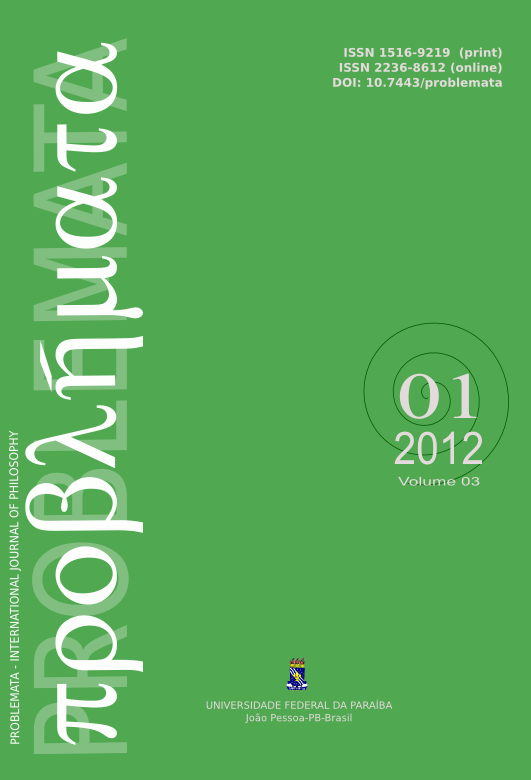REFLECTION ON THE EROTIC IN THE LEVINAS'S WORK “TIME AND THE OTHER"<a href="http://dx.doi.org/10.7443/problemata.v3i1.12998"><i> <b>[doi: 10.7443/problemata.v3i1.12998]</b></i></a>
DOI:
https://doi.org/10.7443/problemata.v3i1.12998Keywords:
Erótica, Alteridade, Feminilidade, Fecundidade, PaternidadeAbstract
We propound to present the Levinasian reflection on the erotic in the work “Time and the Other”. It deals with an exposure of the categories utilized by Levinas to present the erotic as a possible framework of performing the experience of the original relationship with the other, respecting his otherness. He suggests the erotic relationship as a situation capable of displaying “the purity of the otherness of the other”, an idea of otherness that is not a simple inversion of the identity. His intention is to defend a conception of otherness as an own way of being of the other. He presents the category of the feminine as a term that “absolutely retains its otherwise”. Here he is concerned in exposing his comprehension of “sexual difference”, distinguishing it from the “logical division in genera and species”, the “contradiction”, and the “duality”. He proposes the caress as a mode of contact that is concretized beyond itself, the objectivity and opens itself to the inaccessible future. Lastly, he makes the concept of fecundity explicit, showing how in the erotic “the self can convert itself into different of itself”, which is made possible through paternity.KEYWORDS: Erotic. Otherness. Femininity. Fecundity. Paternity.
Downloads
Download data is not yet available.
Downloads
Published
2012-07-03
Issue
Section
Papers
License
Authors who publish with this journal agree to the following terms:
- Authors retain copyright and grant the journal right of first publication with the work simultaneously licensed under a Creative Commons Attribution License that allows others to share the work with an acknowledgement of the work's authorship and initial publication in this journal.
- Authors are able to enter into separate, additional contractual arrangements for the non-exclusive distribution of the journal's published version of the work (e.g., post it to an institutional repository or publish it in a book), with an acknowledgement of its initial publication in this journal.
-
- Authors are permitted and encouraged to post their work online (e.g., in institutional repositories or on their website) prior to and during the submission process, as it can lead to productive exchanges, as well as earlier and greater citation of published work (See The Effect of Open Access).





